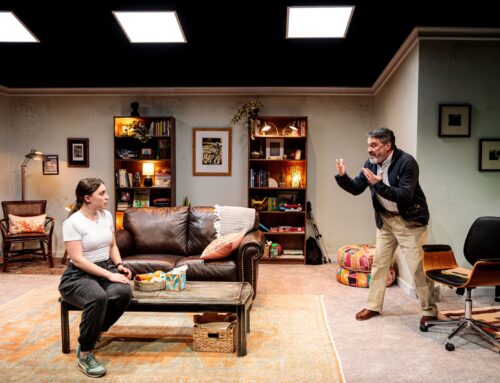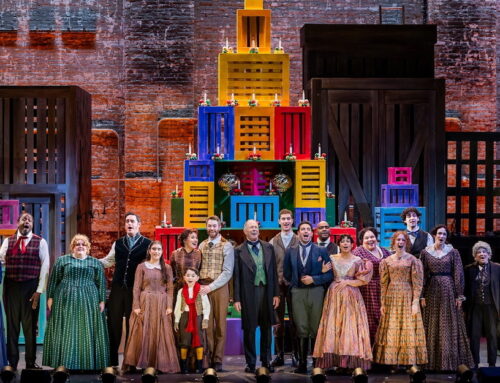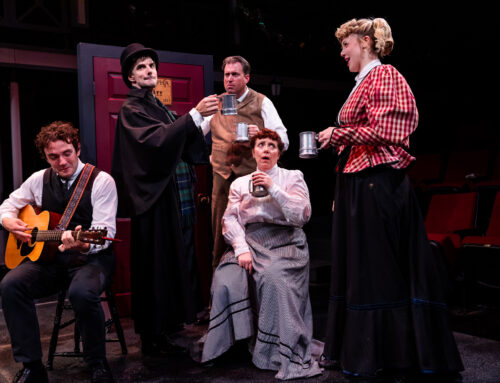You got yer ADD, yer ADHD, yer PTSD, yer OCD and now yer O.P.C. at the A.R. T.! The title stands for “Obsessive Political Correctness,” a syndrome that plagues the compulsively sensitive, and finds its expression in a world premiere production by author, activist, & Tony-Award winning playwright of “The Vagina Monologues” Eve Ensler, who no doubt has more than a touch of the condition. The play is poetry in motion– which is to say, it is not particularly theatrical, but it does contain beautifully verbalized positions on sustainability, recycling, waste, and the unexpected creative potential of garbage. The latter is a notion central to what makes Ensler tick– she has devoted her life to “that which” and “those who” have been underestimated, hidden, discarded, corrupted, and abused by the power structure, specifically women– the most consistently marginalized majority in global history. In O.P.C., Ensler has once again married art to activism, and the result is an ungainly, but laudable set of ideas in search of dramatic momentum.
Directed by Pesha Rudnick, the play opens on a set picturesquely strewn with refuse–empty clear plastic water bottles are strung out overhead and into the audience like popcorn, and will find their apotheosis in the final “illuminating” moments. In keeping with the play’s political agenda, almost all of the costumes, sets, props were designed from cast-off and/or re-cycled materials. No programs were printed, etc. There are lots of free events scheduled around these issues. I hesitated before pulling out a pad of paper to take notes.
In the first scene is Romi (Olivia Thirlby) a “Freegan” (they really exist!) who looks like Pippi Longstocking squatting in an abandoned apartment, colorfully arrayed with wooden crates and all manner of re-imagined scrap. When Romi’s mom Smith (Kate Mulligan) swings by to have lunch on her way to running for the U.S. Senate, her daughter serves up a plate of slightly used tomatoes from a recent dumpster dive, and mom loses her appetite. It’s another episode in a long-standing political/philosophical debate between them: mom believes in joining the power structure to improve the system from within, while daughter Romi the radical wants to create a whole new world. Romi’s sister Kansas (Nicole Lowrance) is her mom’s clone in temperament and attire; in one of the funniest monolgues in the play, she laments the fact that their respective names have determined their destinies: Romi is as freewheeling and exotic as the ancient city in which she was conceived, while Kansas is as corny and conventional as— Kansas.
As Romi, Olivia Thirlby has a stagey, halting way with a line and I didn’t buy a word she said; Nicole Lowrance as Kansas was a bit broad, but funny. As the loving, cheerful, supportive, pacifying, “live and let live” father Bruce (he’s got the “girl” part!)Michael T. Weiss does as much as he can in an underwritten role. In a similarly thankless and underdeveloped part is Peter Porte as Damien a handsome, yes-man/campaign aide/boy toy who hooks up with Romi. The queen bee hovering above all is Smith played with great verve by Kate Mulligan as a powerhouse of a driven modern woman: mother, wife, politician, and exemplar of the insatiable “neo-liberal capitalist” cartel at which Ensler takes steady aim, and she’s rounded up the usual suspects: fracking, Keystone, nuclear power, blood diamonds, fur, idiotic TV divas– Oprah and a speech-impeded Barbara Walters redux (Do these women really deserve to be so caricatured?), and anyone with too much ambition, which is but “a shield against suicidal thoughts and feelings.”
When Romi presents mom with a dress she’s made of re-cycled fruit skin, Smith does her own bit of recycling– consuming and repackaging Romi’s “high trashion” garb into a money-making proposition as well as much more palatable ideological fodder for the “consumer” in order to WIN! Eventually, Romi has no stomach for the compromise, and after a bout of “splurging” and “purging,” regurgitates the whole nasty bargain, ending up in the looney bin WITHOUT her blue suede Prada boots, and WITH a posse of multicultural cohorts and a disembodied voice for a doctor. The thing that eventually gets mom and daughter back to square one? Bonding over their mutual appreciation for good old-fashioned, passionate sex. It’s an odd moment, but a way to circle back to what Ensler is after here–being in touch with who we are and what we are doing. Not winning, not owning, not achieving–except, perhaps– the occasional multiple orgasm.
As for the play? It has no climax, only a warm and fuzzy resolution, designed to make us want to pick up placards and demonstrate. The same positions are stated over and over again, but there’s never a moment when these characters organically collide in a way that makes me feel like something in the play is immediately at stake– not Smith’s election, or Romi’s sanity. The world of the play had none of the texture of real life and seemed so weird as to be unrelatable. I kept feeling like these characters stood for something, rather than just standing for themselves in the fullness of their humanity. None of them seemed fully alive enough to make us care. O.P.C. is TGTM–too glib to matter–to get me where I live. At the American Repertory Theater through January 4!






Leave A Comment
You must be logged in to post a comment.